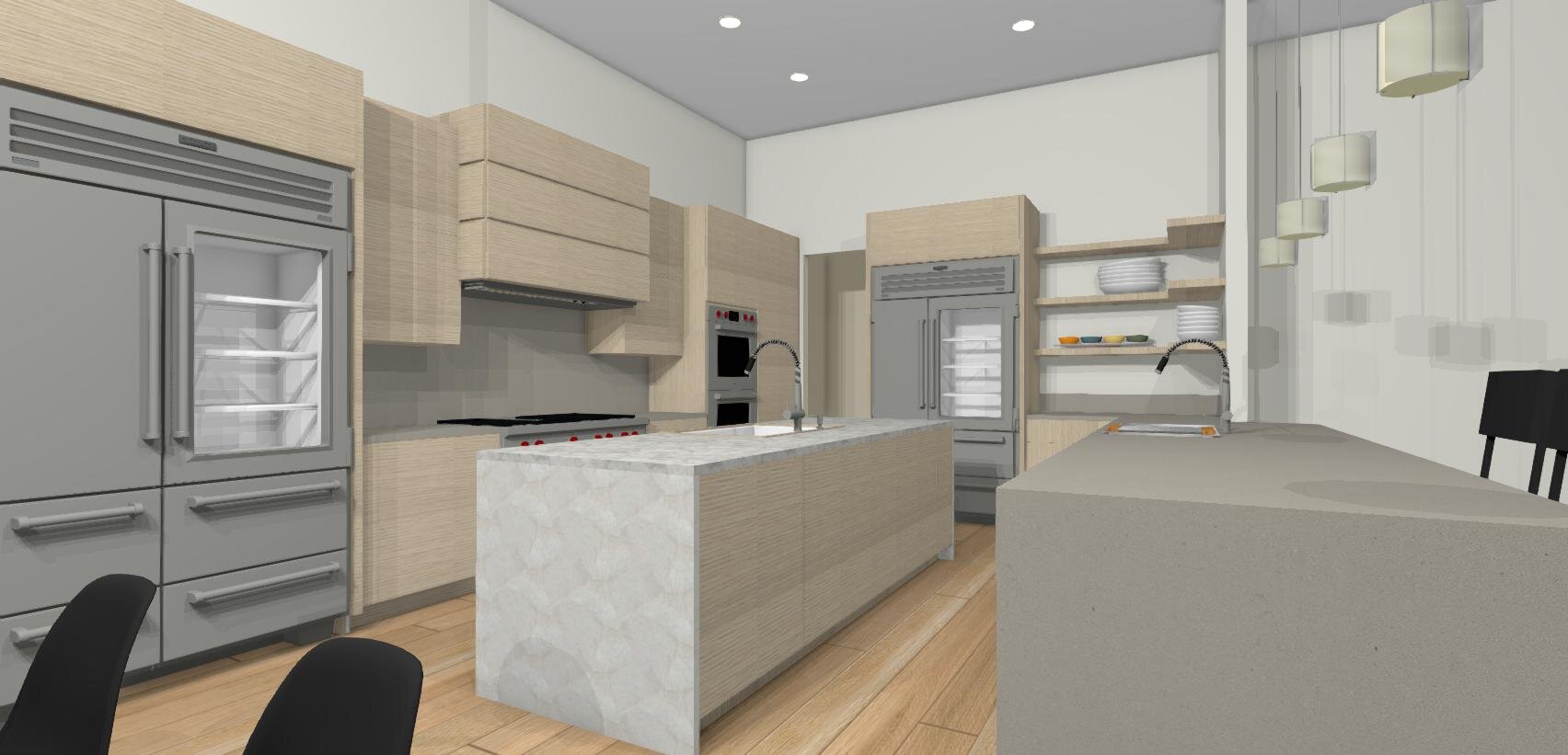Recently I had the pleasure of collaborating with Poggenpohl Kitchens and Florida Design Magazine to chat about Wellness in the Kitchen. I was honored to participate on a panel with designers Eric Small of Poggenpohl, Alena Capra of Alena Capra Designs and our moderator Daphne Nikolopoulos, Editorial Director of Florida Design Magazine. The event, held at DCOTA (Design Center of the Americas) was a part of the DCOTA Fall Market.
Wellness was the hot topic at DCOTA (Design Center of the Americas) Fall Market event.
When it comes to the kitchen, wellness incorporates a broad spectrum of topics encompassing safety, healthy eating, accommodating aging and more. I have a feeling we’re going to hear more and more about this especially at the upcoming KBIS 2020 (Kitchen & Bath Industry Show). Get a head start right here with the best ways to make wellness a win in your kitchen.
The wellness panel and our hosts at Poggenpohl’s DCOTA showroom
MINDFUL MATERIALS
Using our resources efficiently includes selecting renewable resources whenever possible and doing the research to make sure you’re using responsibly grown and harvested woods. Brands that do this tout it so it’s easy to find on their websites.
Renewable resources like bamboo also reflect a tropical contemporary vibe. Photo by Peppermint Wind. Cabinets by Brendan Donovan
People are also more aware than ever of chemical sensitivities so it pays to educate yourself on subjects such as VOCs (volatile organic compounds) . Formaldehyde is often a culprit but mold is also a possible issue. It’s important to use materials that don’t promote bacterial and mold growth, especially on work surfaces. Quartz, because it’s non-porous, does not trap bacteria or mold.
“There is artfulness in every aspect of crafting a kitchen. It’s not just in the aesthetics, but also being mindful about wellness and function. That is the Artful Kitchens philosophy.”
NATURAL LIGHT
Light doesn’t only fill an obviously functional purpose, it also has a significant effect on mood. The correct lighting can transform a space! In a re-design, consider whether your space allows for a new or larger window. Another consideration is materials. Lighter toned and more reflective finishes can enhance available light. You can also opt for a couple glass door cabinets. High horizontal windows, especially in bathrooms, can maximize natural light without inhibiting function. LED lights also come in a wide range of choices including natural daylight. If you don’t have enough natural light add some strategically placed recessed lights or attractive pendant light fixtures.
Let there be light! There is a reason why sinks are so frequently located under a window. Natural light is healing as well as functional. Counter tops are white quartz. Photo by Peppermint wind.
FRESH FOOD
Eating natural, fresh farm-to-table is gaining in popularity. This changes our storage needs in the kitchen. If possible, I love to customize the refrigeration and locate it where you need it. For example, a set of under counter refrigerator drawers in the food prep zone works well as a supplement to the main fridge. Also, designate open shelving for produce that should not be refrigerated. Think baskets for onions and potatoes.
Fresh produce at the Saturday morning Lake Worth Beach Farmer’s Market. Photo by Gloria Sollecito
VENTILATION
When I’m designing a new kitchen I always try to educate my clients on the importance of good ventilation, especially if you’re using gas. One study claims that up to 48% of people don’t use ventilation when cooking because they don’t consider it necessary. Trust me, it is. Have you ever dusted remote areas in your kitchen and discovered that grease film? It’s definitely real. The best way to go, if you can, is to vent to the outside. Other options are called recirculating which means that smoke and grease pass through a filter and returned to the room. These are just a few thoughts on the subject. We could have a long conversation about this!
This 3D rendering I created shows a modular styled range hood that integrates with cabinets with contemporary styling
ELDER CONSIDERATIONS
Having elderly parents makes me very cognizant of these needs. Yes, simplicity and accessibility are important but even color and pattern are also crucial. As we embrace technology it doesn’t help those who can’t figure it out, old or young! Look for controls that are intuitive and easy to see. Visit a good appliance showroom, touch and feel. Many brands will help you learn how to use your new appliances. This is another long convo topic.
Clear intuitive appliance controls such as in this example by Electrolux are an elder consideration in the kitchen.
These are, of course, just a few of the things to incorporate in a kitchen design. A big thank you to Florida Design Magazine and Poggenpohl for including me in this fabulous event!







